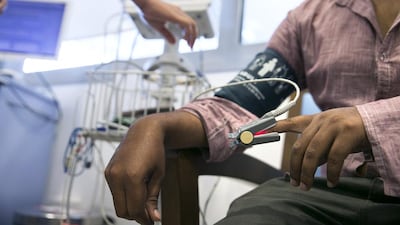You can expect fancy coffee shops, free Wi-Fi, welcome juices, dedicated relationship officers and much more when you visit some of Abu Dhabi’s best-known private hospitals. From the moment you walk through their sliding doors, you are greeted as a cherished guest and guided with courtesy and professionalism to your clinic of choice. In fact, the entire experience from the moment you park your car – or use the valet parking service – until you enter your doctor’s office is one of peace and tranquillity.
Those of us who remember the very limited options that were once available in Abu Dhabi appreciate just how far the private health care sector has come in terms of customer service, equipment and availability of medication.
In the past, when a medical condition was considered serious, plans to travel abroad to seek medical attention were immediately put in place, usually with assistance from the government. Now, the UAE has become a destination of choice for medical care for many people in the region and beyond.
Yet, the privatisation of medical care has brought with it the bean counters of the hospital finance departments whose profitability targets put pressure on the way physicians deal with their patients and has affected the quality of medical staff.
I recently visited what is considered to be one of Abu Dhabi’s best private hospitals to seek treatment for an old but serious back injury. It resulted in a five-minute consultation with a doctor who conducted a knee reflex test and immediately decided to recommended surgery. Knowing full well the history of my injury and that surgery was far from what I needed, I decided to collect my papers and move on to what I understood to be the second-best hospital in the capital.
This time, the physician decided to skip the physical check-up entirely and took only three minutes to recommend surgery. I debated the issue with him and we later agreed that anti-inflammatory medication, bed rest and some physiotherapy would suffice.
Many people I know have had similar experiences where the patient ends up bargaining with the doctor, almost pleading for him or her to push aside the need to make a profit through surgery and focus on a suitable alternative diagnosis. There are even horror stories of children being put through unnecessary surgeries, perfectly healthy teeth being removed and, of course, bags and bags of unnecessary medication being prescribed.
Even with this in mind, many of us still opt for private care over government hospitals. Childbirth is a perfect example. While it is widely understood that government hospitals offer far better medical equipment to deal with difficult deliveries, many couples still choose to deliver their children in private hospitals. Why? Because anyone whose child was born in a government hospital can tell you that the process is like being on a factory line.
Many countries have implemented private health care to offer services that are not available in the government sector. But we are fortunate enough to live in a country where the government spares no expense in aiming for world-class standards in all sectors, including health. Our government hospitals offer some of the most advanced medical equipment, facilities and personnel the world has to offer. Health tourism is rising rapidly in the country and the Health Authority Abu Dhabi is working wonders. So why do we turn to private hospitals?
To start with, it’s the shorter waiting time to see physicians – though this seems to be getting worse in some private hospitals, particularly to see paediatricians. Also, waiting lists for appointments can be horrendous in government hospitals. For example, it is absolutely normal to wait three months for your next dental appointment in the government sector. And, of course, the overall ambience of government hospitals, as in countries all over the world, is not appealing. The interior designs are outdated, with awful bland colours, and often the civil servants who assist you in your visit to the hospital are not very friendly.
Things are improving all the time in the government health sector but they are still losing the race to private sector hospitals whose hotel-style management and facilities are popping up all over Abu Dhabi – even in malls, to make your shopping experience richer.
With the private sector – and this is the same in hospitals worldwide – it is a business. We have to ask: are we now receiving too much health care with too many pills, too many tests and far too many visits?
I think we need to push the envelope even further in our government health care, offering more facilities, better management, and more clinics and physicians to ensure that they are our first choice before we automatically look towards those who will profit from our illness.
Taryam Al Subaihi is a political and social commentator who specialises in media and communications
On Twitter: @TaryamAlSubaihi

